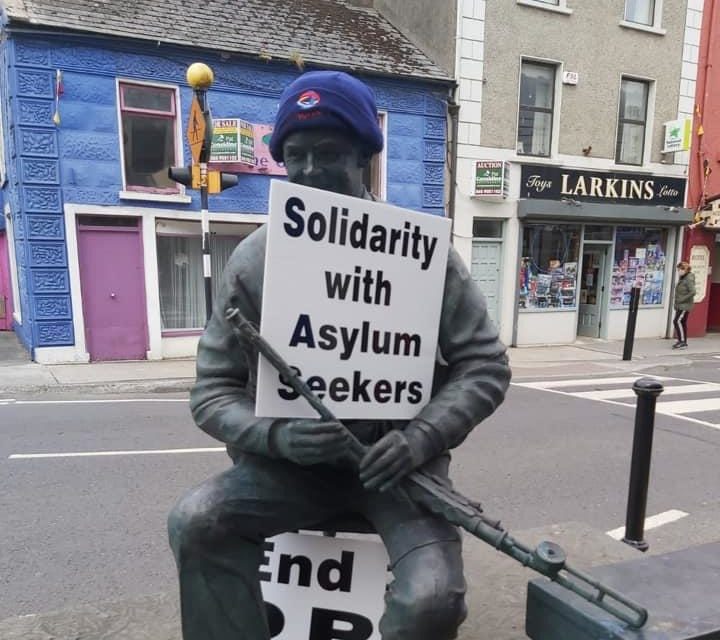• A voluntary group set up last year to welcome asylum-seekers to West Clare welcomed the Department of Justice and Equality’s decision in August to close the emergency Direct Provision centre.
• On August 12th – the day the closure was announced – the Miltown Malbay Welcome Group thanked Minister Helen McEntee for her prompt action.
• Civil society voices who welcomed the move included Clare PPN’s Sarah Clancy, author Ruairi McKiernan, and human rights activist John Lannon.
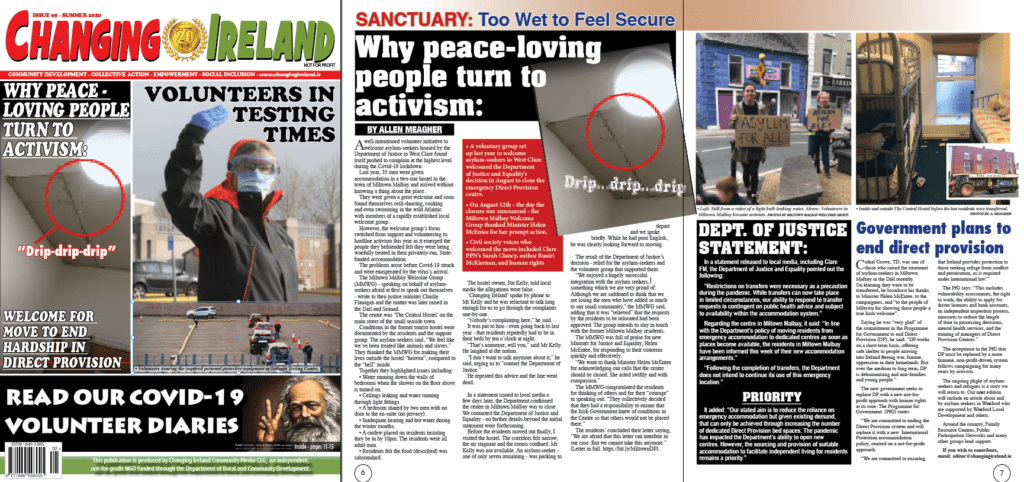
• This story first featured in Issue 69, Summer 2020 – full edition available here: https://www.changingireland.ie/wp-content/uploads/2020/08/Issue-69-32p-Summer-2020-Aug25-2.pdf
A well-intentioned volunteer initiative to welcome asylum-seekers housed by the Department of Justice in West Clare found itself pushed to complain at the highest level during the Covid-19 lockdown.
Last year, 35 men were given accommodation in a two-star hostel in the town of Miltown Malbay and arrived without knowing a thing about the place.
They were given a great welcome and soon found themselves ceili-dancing, cooking and even swimming in the wild Atlantic with members of a rapidly established local welcome group.
However, the welcome group’s focus switched from support and volunteering to hardline activism this year as it emerged the people they befriended felt they were being woefully treated in their privately-run, State-funded accommodation.
The problems arose before Covid-19 struck and were exasperated by the virus’s arrival.
The Miltown Malbay Welcome Group (MMWG) – speaking on behalf of asylum-seekers afraid at first to speak out themselves – wrote to then justice minister Charlie Flanagan and the matter was later raised in the Dail and Seanad.
The centre was ‘The Central Hostel’ on the main street of the small seaside town.
Conditions in the former tourist hostel were documented by the residents and the support group. The asylum-seekers said, “We feel like we’ve been treated like animals and slaves.” They thanked the MMWG for making their lives outside the hostel “heaven”, compared to the “hell” inside.
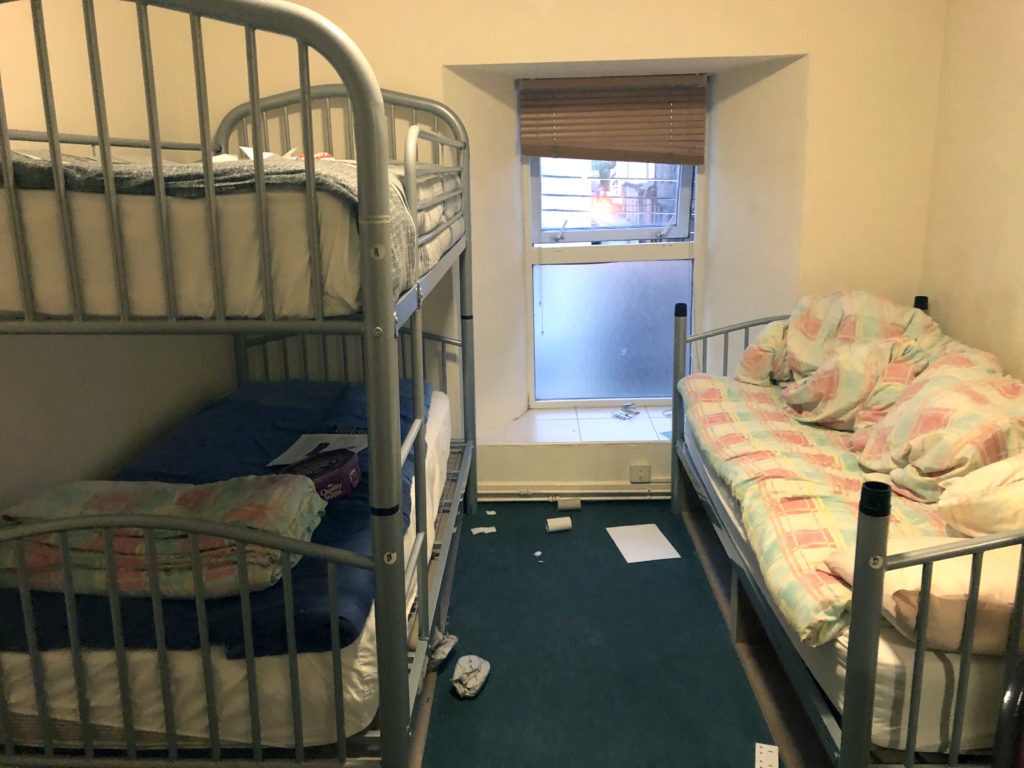
• Inside The Central Hostel before the last residents were transferred. Photo: A. Meeagher.
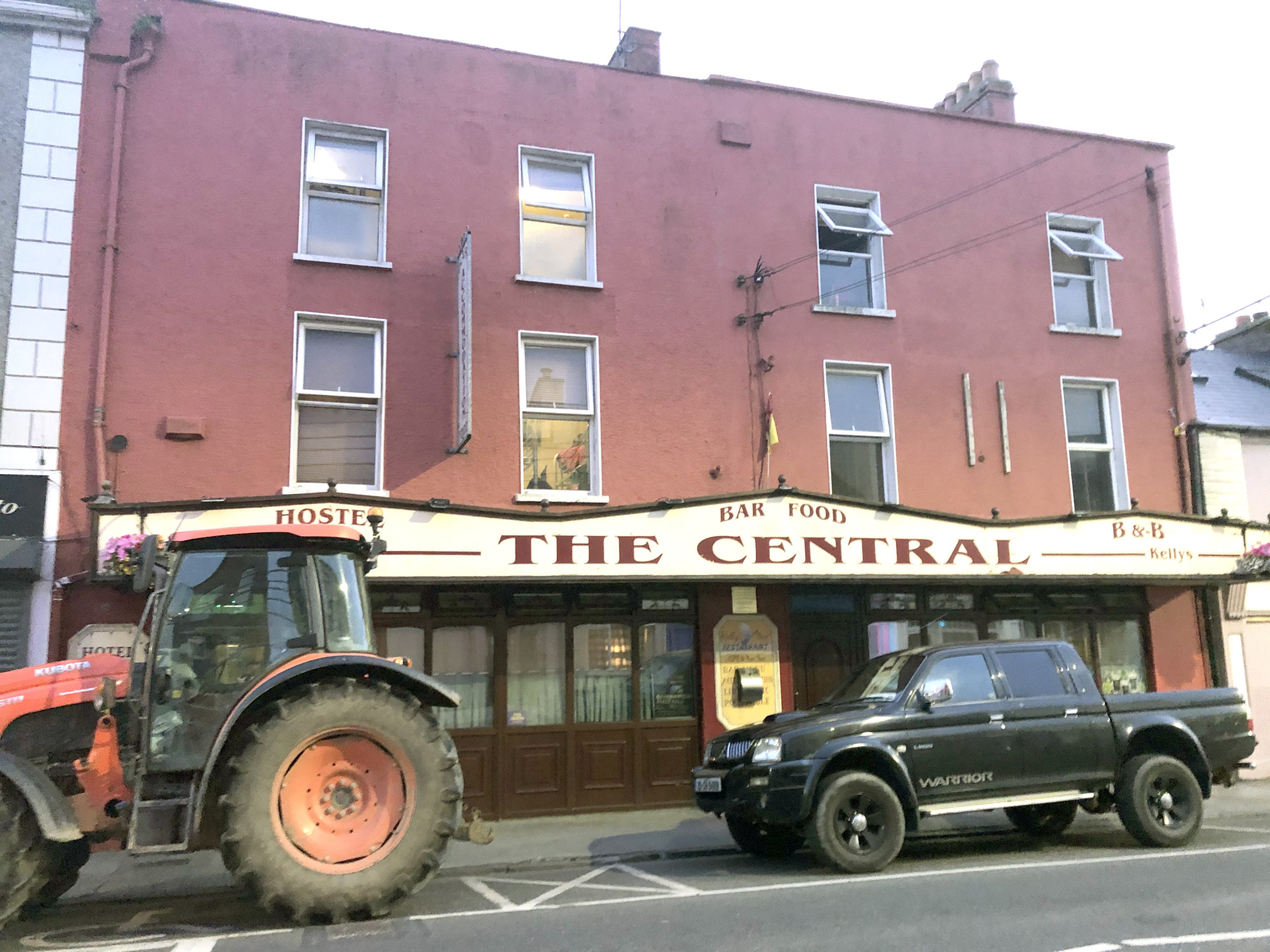
• Outside The Central Hostel days before the last residents were transferred.
Together they highlighted issues including:
• Water running down the walls of bedrooms when the shower on the floor above is turned on.
• Ceilings leaking and water running through light fittings.
• A bedroom shared by two men with no door to the en-suite (no privacy).
• Inadequate heating and hot water during the winter months.
• A curfew placed on residents insisting they be in by 10pm. The residents were all adult men.
• Residents felt the food (described) was substandard.
The hostel owner, Pat Kelly, told local media the allegations were false.
‘Changing Ireland’ spoke by phone to Mr Kelly and he was reluctant to talk long enough for us to go through the complaints one-by-one.
“Nobody’s complaining here,” he said.
It was put to him – even going back to last year – that residents reputedly had to be in their beds by ten o’clock at night.
“That’s nonsense, will you,” said Mr Kelly. He laughed at the notion.
“I don’t want to talk anymore about it,” he said, urging us to “contact the Department of Justice.”
He repeated this advice and the line went dead.
In a statement issued to local media a few days later, the Department confirmed the centre in Miltown Malbay was to close. We contacted the Department of Justice and Equality – no further details beyond the initial statement were forthcoming.
Before the residents moved out finally, I visited the hostel. The corridors felt narrow, the air stagnant and the rooms confined. Mr Kelly was not available. An asylum-seeker – one of only seven remaining – was packing to depart and we spoke briefly. While he had poor English, he was clearly looking forward to moving.
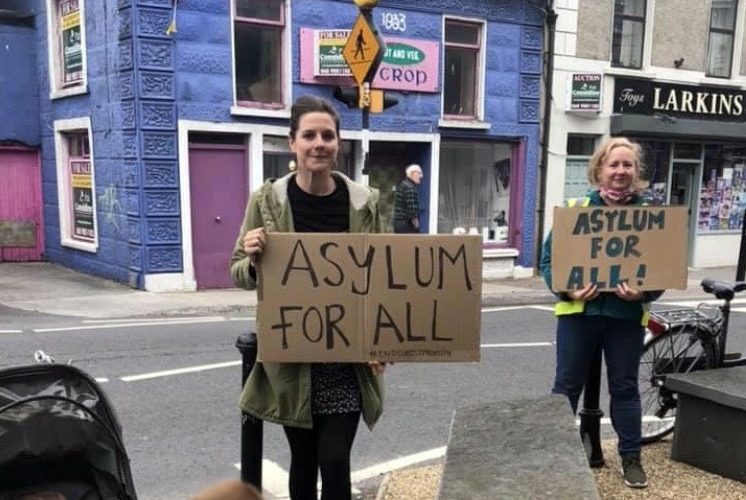
• Volunteers in Miltown Malbay became activists. Photo by: Miltown Malbay Welcome Group.
The result of the Department of Justice’s decision – relief for the asylum-seekers and the volunteer group that supported them:
“We enjoyed a hugely successful integration with the asylum seekers, something which we are very proud of. Although we are saddened to think that we are losing the men who have added so much to our small community,” the MMWG said, adding that it was “relieved” that the requests by the residents to be relocated had been approved. The group intends to stay in touch with the former Miltown Malbay residents.
The MMWG was full of praise for new Minister for Justice and Equality, Helen McEntee, for responding to their concerns quickly and effectively.
“We want to thank Minister Helen McEntee for acknowledging our calls that the centre should be closed. She acted swiftly and with compassion.”
The MMWG congratulated the residents for thinking of others and for their “courage” in speaking out: “They collectively decided that they had a responsibility to ensure that the Irish Government knew of conditions in the Centre so that others would not be placed there.”
The residents’ concluded their letter saying, “We are afraid that this letter can interfere in our case. But we cannot take this anymore.” (Letter in full: https://bit.ly/MiltownDP).
Dept. of Justice statement:
In a statement released to local media, including Clare FM, the Department of Justice and Equality pointed out the following:
“Restrictions on transfers were necessary as a precaution during the pandemic. While transfers can now take place in limited circumstances, our ability to respond to transfer requests is contingent on public health advice and subject to availability within the accommodation system.”
Regarding the centre in Miltown Malbay, it said: “In line with the Department’s policy of moving residents from emergency accommodation to dedicated centres as soon as places become available, the residents in Miltown Malbay have been informed this week of their new accommodation arrangements.”
“Following the completion of transfers, the Department does not intend to continue its use of this emergency location.”
priority
It added: “Our stated aim is to reduce the reliance on emergency accommodation but given existing demand, that can only be achieved through increasing the number of dedicated Direct Provision bed spaces. The pandemic has impacted the Department’s ability to open new centres. However, the sourcing and provision of suitable accommodation to facilitate independent living for residents remains a priority.”
Government plans to end direct provision
Cathal Crowe, TD, was one of those who raised the treatment of asylum-seekers in Miltown Malbay in the Dáil recently. On learning they were to be transferred, he broadcast his thanks to Minister Helen McEntee, to the campaigners, and “to the people of Miltown for showing these people a true Irish welcome”.
Saying he was “very glad” of the commitment in the Programme for Government to end Direct Provision (DP), he said: “DP works on a short-term basis, offering safe shelter to people arriving into Ireland fleeing war, famine, oppression in their homelands. But over the medium to long term, DP is dehumanising and anti-families and young people.”
The new government seeks to replace DP with a new not-for-profit approach with human rights at its core. The Programme for Government (PfG) states:
“We are committed to ending the Direct Provision system and will replace it with a new International Protection accommodation policy, centred on a not-for-profit approach.
“We are committed to ensuring that Ireland provides protection to those seeking refuge from conflict and persecution, as is required under international law.”
The PfG says: “This includes vulnerability assessments, the right to work, the ability to apply for driver licences and bank accounts, an independent inspection process, measures to reduce the length of time in processing decisions, mental health services, and the training of managers of Direct Provision Centres.”
The acceptance in the PfG that DP must be replaced by a more humane, non-profit-driven system follows campaigning for many years by activists.
The ongoing plight of asylum-seekers and refugees is a story we will return to. Our next edition will include an article about and by asylum seekers in Wexford who are supported by Wexford Local Development and others.
Around the country, Family Resource Centres, Public Participation Networks and many other groups lend support.
If you wish to contribute, email: editor@changingireland.ie

